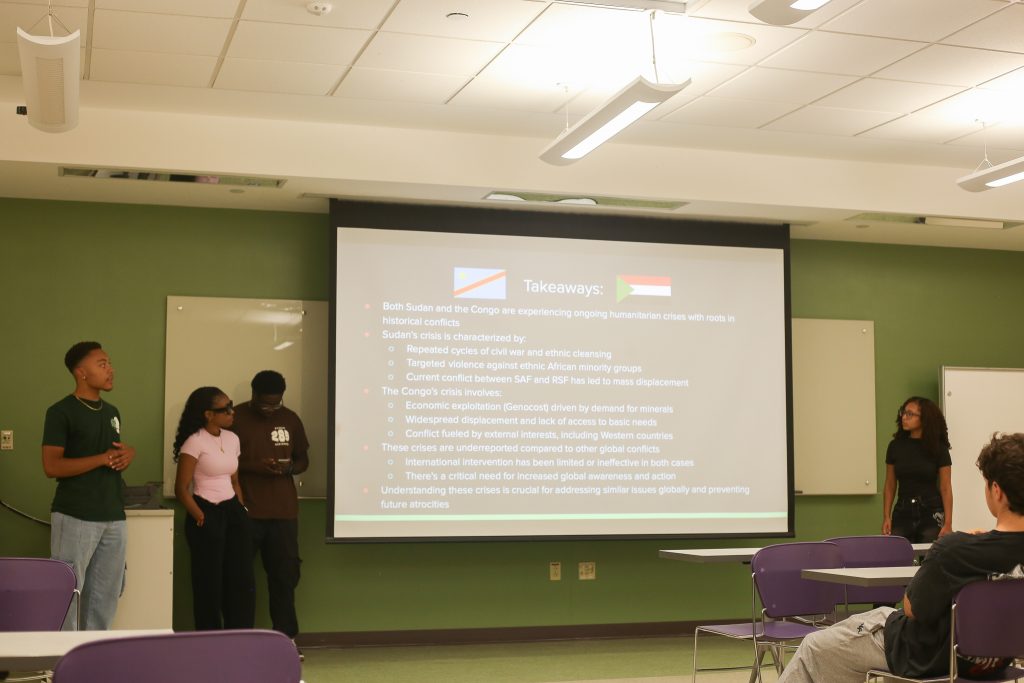A student-led discussion that centered around humanitarian crises in the Congo and Sudan was held on Tuesday evening in the Binghamton University Union.
Spearheaded by the Thurgood Marshall Pre-Law Society and the African Student Organization, the discussion, “Humanity in Crisis: Congo and Sudan,” included a lecture about the historical circumstances surrounding the countries. The presenters were Chelsea Brothers, Thurgood Marshall’s political coordinator and a senior majoring in philosophy, politics and law, and Miles Davis, the organization’s treasurer and a senior majoring in sociology. They were joined by ASO co-activities coordinators Fatoumata Barry, a sophomore majoring in philosophy, politics and law and Larry Ayiku, a senior majoring in biology.
“Goals we had in mind when organizing this discussion is firstly, spreading awareness about what has been happening in these countries,” Brothers wrote in an email. “As all genocides should be spoken about, these two crises have appeared less important and largely silent in the media in comparison to crises such as Ukraine and Palestine. We wanted to discuss the difficult questions of why we think this has been less talked about in the media. Also, we aimed to not only spread awareness to those in the room, but we encouraged our audience to look deeper into these issues and for them to spread awareness to those they know and through our resources in the presentation.”
In the Democratic Republic of the Congo, a genocost — a genocide driven by economic means — is being carried out against Congolese people in eastern Congo. The country has spent over 20 years in crisis, with the aftermath of the Rwandan Genocide — where extremists killed approximately one million Tutsi minorities, who then fled to the Congo — leading to the First and Second Congo Wars. Combined with political conflict, the power struggle has led to poverty, high levels of violence and the displacement of over 7.2 million people as of March 2024.
In Sudan, two civil wars have broken out following the end of British colonialism in 1956, and the second led to the country splitting into two separate states in 2011. Existing tensions and the dictatorship of Omar al-Bashir, who presided over the country during the Darfur War and the genocide of the Fur, Zaghawa and Masalit people, have led to a power struggle between the Sudanese army and the Rapid Support Forces, a militant group. The country faces extreme famine, violence and the ethnic cleansing of Sudanese Arabs, which has led to between 10,000 and 15,000 deaths and the displacement of over 8.2 million people in the last year.
“The Democratic Republic of the Congo and Sudan are confronted with a range of pressing challenges that are closely linked to their political, economic, and social conditions,” Barry wrote in an email. “Both nations are dealing with complex, interrelated problems that demand extensive and ongoing efforts from both domestic and international contributors to effectively address.”
After the talk, the general body shared their questions and concerns about the conflicts in an open discussion. Topics covered included the lack of response to these global crises from campus leaders, pros and cons of U.S. intervention and students’ roles in educating and spreading information.
A University spokesperson did not respond to Pipe Dream’s request for comment.
The speakers emphasized that these crises garner less attention compared to other global issues. Students shared ideas about why this may be the case, offering proposals like a lack of American involvement, the victims’ race and certain issues being more visible on social media.
“t’s crucial to stay informed on these crises as one, we are benefitting from the demise of Congo while the people are being exploited,” Brothers wrote. “It’s imperative that we acknowledge that and do what we can with our resources to spread awareness. All genocides and crises should be discussed, and it’s crucial that we stop pushing what’s happening in the continent of Africa aside, as they continuously face little to no recognition.”
The discussion concluded with the presenters sharing resources for the general body to inform themselves, spread awareness and donate to the causes.
“We are not reprimanding attendees moreso encouraging them to spend their money, time and attention towards institutions that value all human life above monetary profit,” the African Student Organization wrote in an email. “In the process of this we hope that the institutions they choose to support directly impact the people of Sudan and Congo for the better. If our freedom and luxuries are dependent on the suffering of other people then we are not truly free or living a life of luxury.”



